Giovanni Messe's Glory of Rome: An Independent Italy HOI3 AAR
- Thread starter mankle30
- Start date
-
We have updated our Community Code of Conduct. Please read through the new rules for the forum that are an integral part of Paradox Interactive’s User Agreement.
You are using an out of date browser. It may not display this or other websites correctly.
You should upgrade or use an alternative browser.
You should upgrade or use an alternative browser.
Will conquering the rest of continental France be enough to subdue them or will you have to conquer their colonies as well?
What's Germany doing currently, are they preparing for Barbarossa?
Germany is pretty much sitting on its rear end. It looks as if taking the colonies is necessary to getting another surrender. That, however, is not in our plans.
I hope they decide to surrender properly this time.
The game mechanic is definitely flawed and another surrender will only take a single region or two. Frankly, I have other ideas.
Part 29: Operazione Cosce di Rana (September 15 - November 5, 1940)
From the personal journal of Giovanni Messe:
While the initial resistance was stronger than anticipated, our forces had the French on the run right from the start. In the first week, our casualty numbers were far lower than the French. In battles at St. Armand Montrond, Sancoins, Bayonne and Barcelonnette, the French lost 2822 men and our forces only 840.
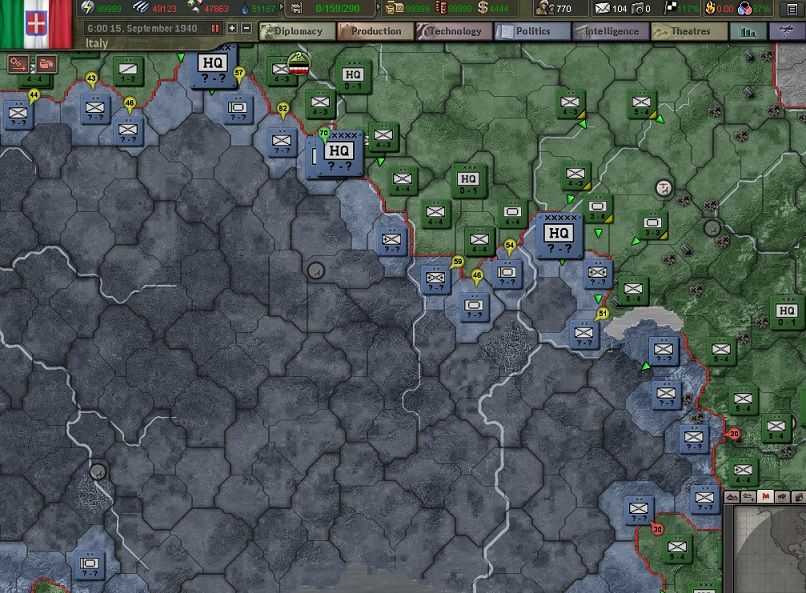
By the end of the first week of battle, our troops had taken massive amounts of territory and most French units were losing their ability to fight back.
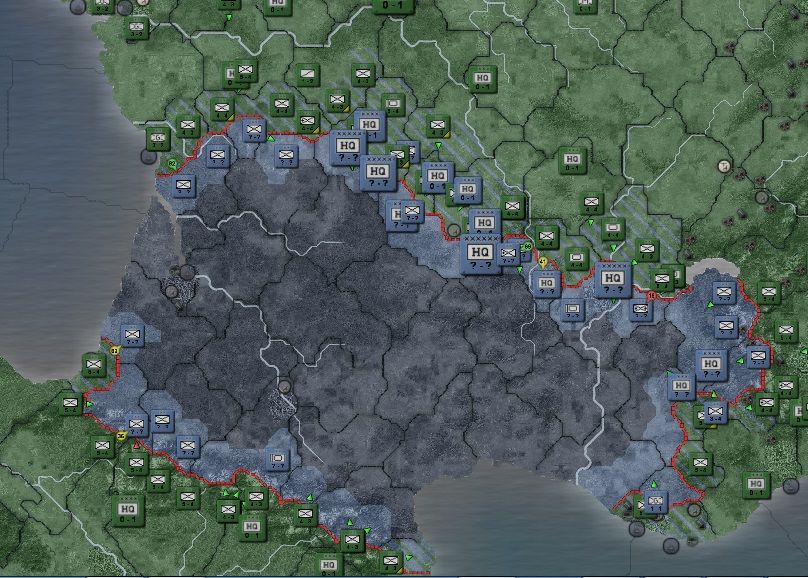
On October 7, the Regia Marina reported to me that another battleship, the Conte di Cavour, had been lost in fighting against the Royal Navy off the coast of Egypt. This was another tough loss but, once again, with the focus of our navy was going to be on carriers and, while losing a battleship was tough, it would not be the end of the world.
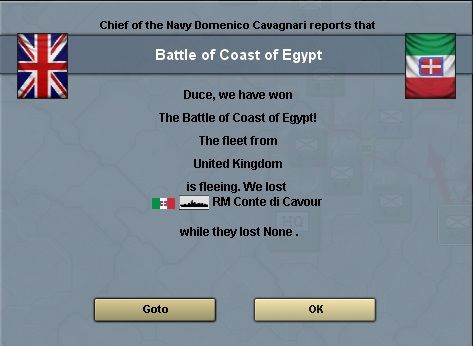
The situation in France was far better than that of our navy. By October 7, we had shrunk French territory to less than half of what it was before we started our new offensive.
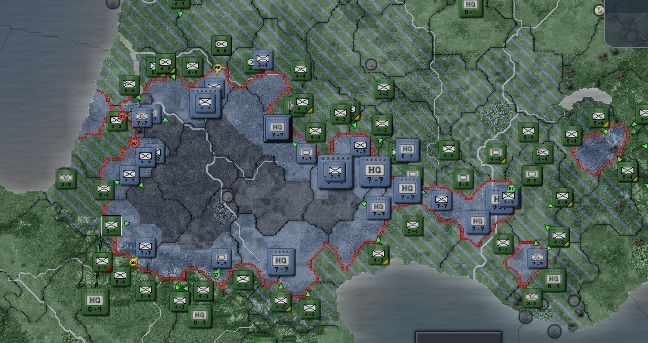
In North Africa, we had surrounded Alexandria on the way to the Suez and our troops were closing in on eliminating more British divisions, and ultimately, resistance in North Africa. While the battle was raging, a French fleet had been intercepted by Carrier Task Force Aquila and was getting hammered by our CAGS and light cruisers, particularly after Carrier Task Force Sagittario joined the battle.
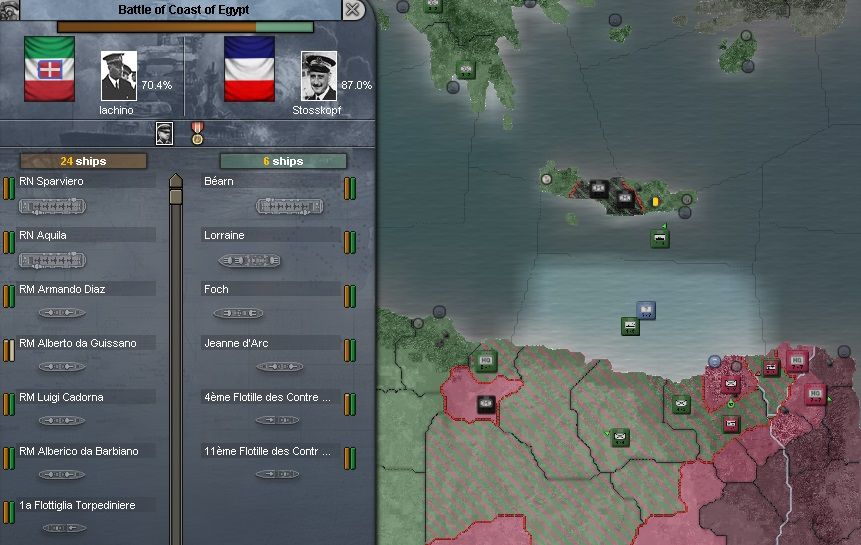
By October 11, we had closed the French down to two pockets, a small one in the east and a bigger one in the west.
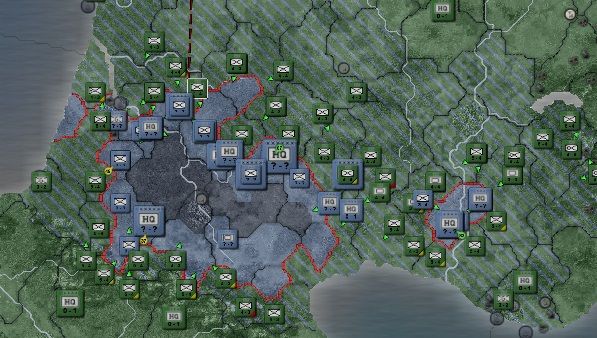
Once the British joined the battle of the Gulf of Bomba off the coast of Egypt, our beleaguered fleets were taking a real beating.
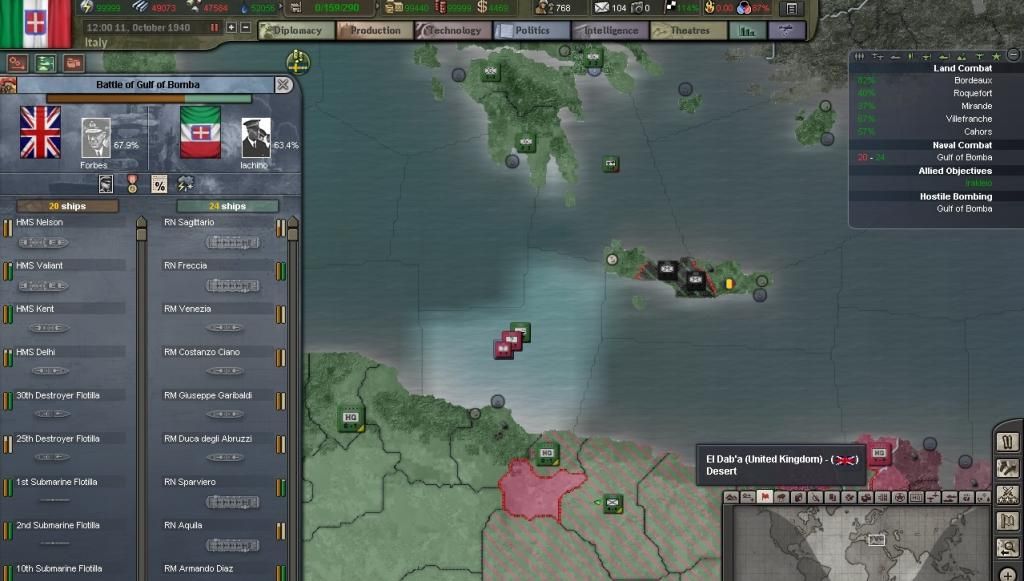
Within a month of the beginning of the attack, the eastern pocket was collapsed and our troops were closing the western one.
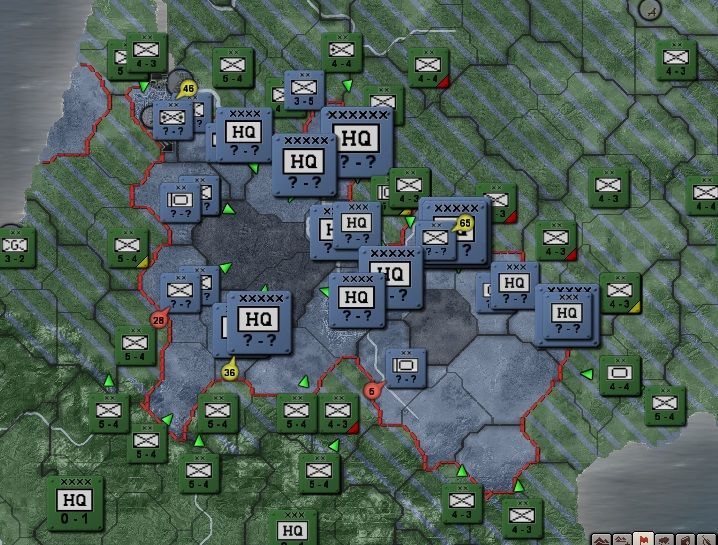
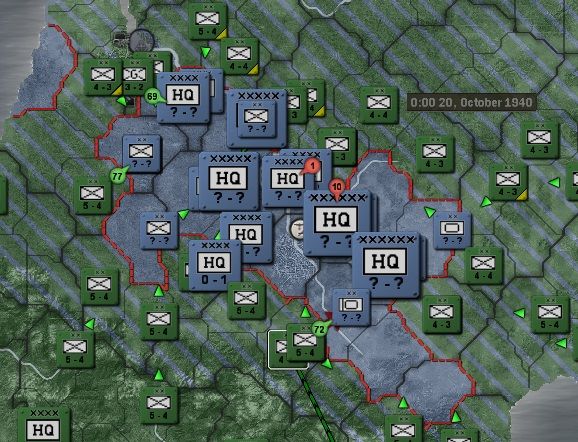
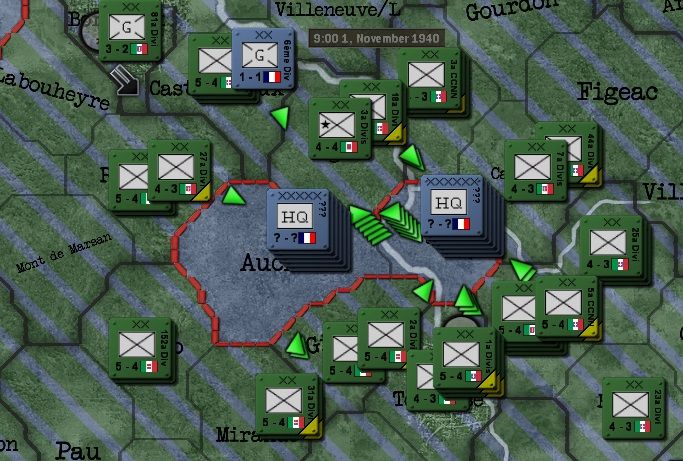
In early November, the battle was almost won. On November 5, the French resistance had completely collapsed and the French attack was over. Our troops would now be redeployed to prepare for the invasion of England. France was in no position to mount a threat against us and while they were technically still at war and existing as a government elsewhere, all of their troops in Europe had been captured and would not be able to harm Italy's ambitions.
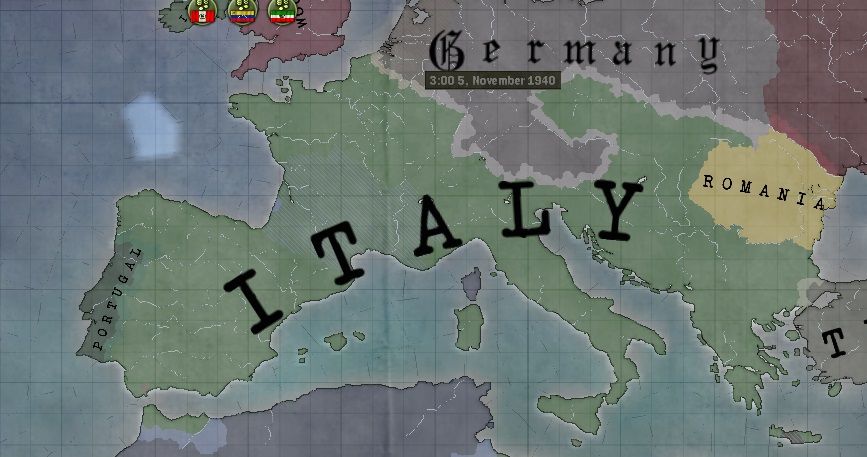
From the personal journal of Giovanni Messe:
While the initial resistance was stronger than anticipated, our forces had the French on the run right from the start. In the first week, our casualty numbers were far lower than the French. In battles at St. Armand Montrond, Sancoins, Bayonne and Barcelonnette, the French lost 2822 men and our forces only 840.

By the end of the first week of battle, our troops had taken massive amounts of territory and most French units were losing their ability to fight back.

On October 7, the Regia Marina reported to me that another battleship, the Conte di Cavour, had been lost in fighting against the Royal Navy off the coast of Egypt. This was another tough loss but, once again, with the focus of our navy was going to be on carriers and, while losing a battleship was tough, it would not be the end of the world.

The situation in France was far better than that of our navy. By October 7, we had shrunk French territory to less than half of what it was before we started our new offensive.

In North Africa, we had surrounded Alexandria on the way to the Suez and our troops were closing in on eliminating more British divisions, and ultimately, resistance in North Africa. While the battle was raging, a French fleet had been intercepted by Carrier Task Force Aquila and was getting hammered by our CAGS and light cruisers, particularly after Carrier Task Force Sagittario joined the battle.

By October 11, we had closed the French down to two pockets, a small one in the east and a bigger one in the west.

Once the British joined the battle of the Gulf of Bomba off the coast of Egypt, our beleaguered fleets were taking a real beating.

Within a month of the beginning of the attack, the eastern pocket was collapsed and our troops were closing the western one.



In early November, the battle was almost won. On November 5, the French resistance had completely collapsed and the French attack was over. Our troops would now be redeployed to prepare for the invasion of England. France was in no position to mount a threat against us and while they were technically still at war and existing as a government elsewhere, all of their troops in Europe had been captured and would not be able to harm Italy's ambitions.

Finally, the French keep having such silly notion of surrender. Good to see you aren't stopped by silly surrendering Frenchies. How many troops did they roughly have there? It looked like a rather massive force in the last pocket.
How did those last 2 naval battles go? Nailing that French carrier and the British battleships would be a great step to full control of the Med.
How did those last 2 naval battles go? Nailing that French carrier and the British battleships would be a great step to full control of the Med.
With the French finally dealt with, Germany might just go to war against SU early. I'm not expecting much resistance on the British Isles so, once you landed troops, the battle there should conclude relatively quickly. Will you have to deal with the annoying peace deal mechanic with England as well?
With the French finally dealt with, Germany might just go to war against SU early. I'm not expecting much resistance on the British Isles so, once you landed troops, the battle there should conclude relatively quickly. Will you have to deal with the annoying peace deal mechanic with England as well?
The British don't have a special surrender system like France does. the only problem with the British is that taking just the Isles won't be enough. I'm not sure Egypt adds enough VP to force a surrender. Italy might have to strike against India, if Japan doesn't do it.
Finally, the French keep having such silly notion of surrender. Good to see you aren't stopped by silly surrendering Frenchies. How many troops did they roughly have there? It looked like a rather massive force in the last pocket.
How did those last 2 naval battles go? Nailing that French carrier and the British battleships would be a great step to full control of the Med.
The British and French navies in the Med have been really tough. I didn't notice a notification so I don't think I lost any ships but if you look at the relative health of the org for both the navies, ours took a bit of a beating.
With the French finally dealt with, Germany might just go to war against SU early. I'm not expecting much resistance on the British Isles so, once you landed troops, the battle there should conclude relatively quickly. Will you have to deal with the annoying peace deal mechanic with England as well?
The British don't have a special surrender system like France does. the only problem with the British is that taking just the Isles won't be enough. I'm not sure Egypt adds enough VP to force a surrender. Italy might have to strike against India, if Japan doesn't do it.
To get the Brits to surrender, you usually have to take a couple of provinces in India . . . :/
Part 30: Final Preparations (November 5, 1940 - January 31, 1941)
From the personal journal of Giovanni Messe:
Shortly after the surrounded French army had surrendered, we had taken half of the Suez Canal but, unfortunately, we wouldn't be able to make a direct assault on the east bank. We sent our troops on a long route, all the way around the Sinai Peninsula in order to attack the British from the east. We would give the British nowhere to retreat and capture even more troops - troops that would be unavailable to the British when it came time to attack England herself.
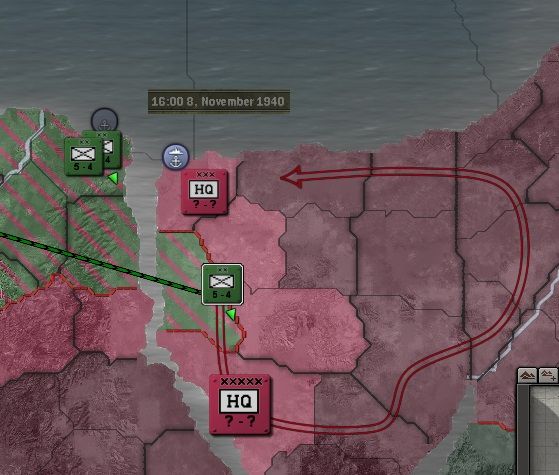
Throughout November and December our CAGs and naval bombers relentlessly bombed the naval base in Ajaccio where three battleships (the Lorraine, the Paris and the Courbet), a heavy cruiser (The Algerie), the light cruiser Jean d’Arc, the 3rd flottila of destroyers and the 3rd and 5th flotillas of submarines were moored. The 4th flotilla of submarines also moored after the 3rd flotilla was sunk.
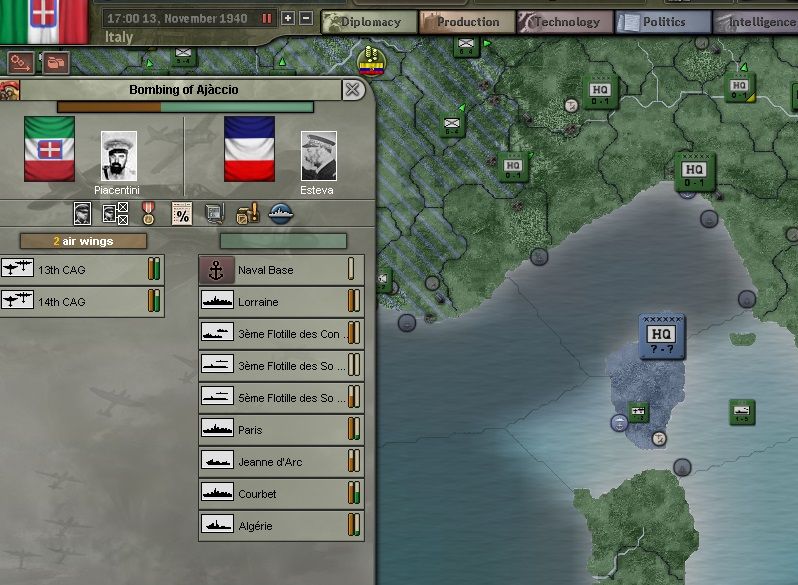
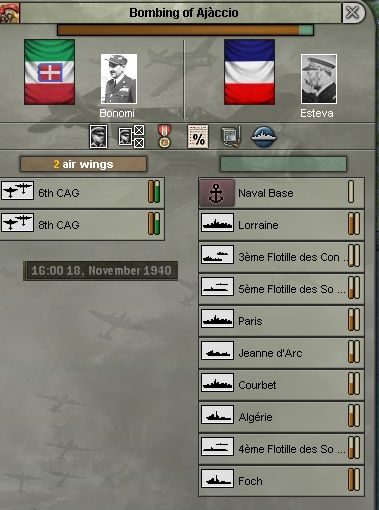
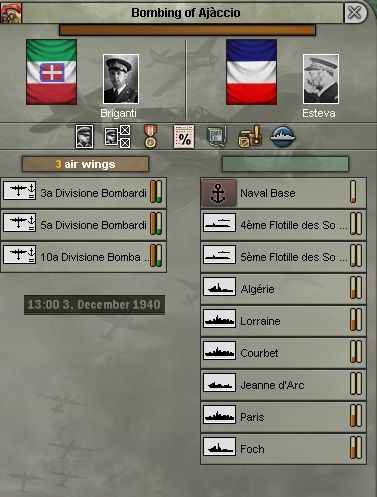
On November 20, we ceased operations off the coast of Corsica in order to rest our fleets. They would be cruicial in the invasion of England in a little over 2 months time. Our radar installation in Cherbourg was up and running and we could see the coast of England on our little screens. Hopefully this would even the field of play for our ships and fighters engaging in operations in England.
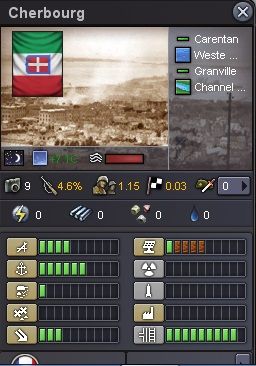
We will keep some troops on French soil to keep the Frogs in line but otherwise, they are left so weak that they will not be able to interfere (at least on land) with our invasion of England.
With about two months until we launch Operazione Otaria, our arrangements are on track. With as many as 35 infantry divisions available for the invasion, the three Marine divisions (who are still training) and two paratroop divisions, we should be able to make a go of it. The only worry will be landing the initial wave of Marines and clearing the skies enough to get all of our paratroops on the ground. If we can capture a port quickly with those five divisions, we should be able ferry troops back and forth across the channel. We will also need to be able to get supplies over to England so we’ll need to be able to clear the channel of hostile ships.
The Germans have been busy, conquering Belgium and Norway and the nature of our current border will make it very difficult to field enough divisions to go head to head. We’ll need to train many more divisions and will likely need to mechanize our infantry once we know that most of our operations will remain in continental Europe.
In these last months of preparation, our researchers made several breakthroughs including for doctrines to help our special forces units perform better, a way to process rare materials more efficiently, a way to improve our invasion tactics (primarily the speed with which we could offload from landing craft) and a better torpedo that would launch from our CAGs and naval bombers.
In addition to the research that is geared specifically for our invasion, we’re also working on a more powerful tank engine for medium tanks (the Fiat SPA 8T is what they’re calling it) as well as a new engine for light tanks. We’re working on mechanizing our infantry and we’re also researching new rifles for our infantry. We have Anti-Aircraft weapons for our light cruisers being researched as well as engines and main armaments for new destroyers. Shortly after some of the current techs are being built, we’ll throw our energies into better technologies for refining steel and processing coal. We also have some aircraft carrier technologies on the back burner.
As December dawned, I briefed Mussolini on what to expect this month. We were likely to gain control of the Suez Canal, with Gioda’s 20th “Friuli” Division in Bur Said on the west side of the canal, Frusci’s 47th “Bari” Division in Bir Gifgafa, just to the south of Romani and General Gariboldi’s 41st “Firenze” Division heading to Misfaq in order to trap the 1st Royal Marines Division.
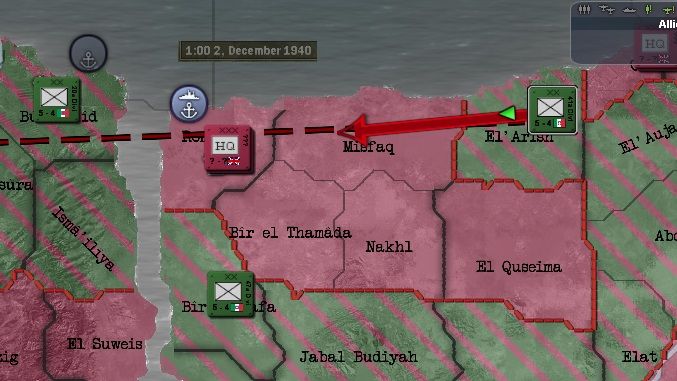
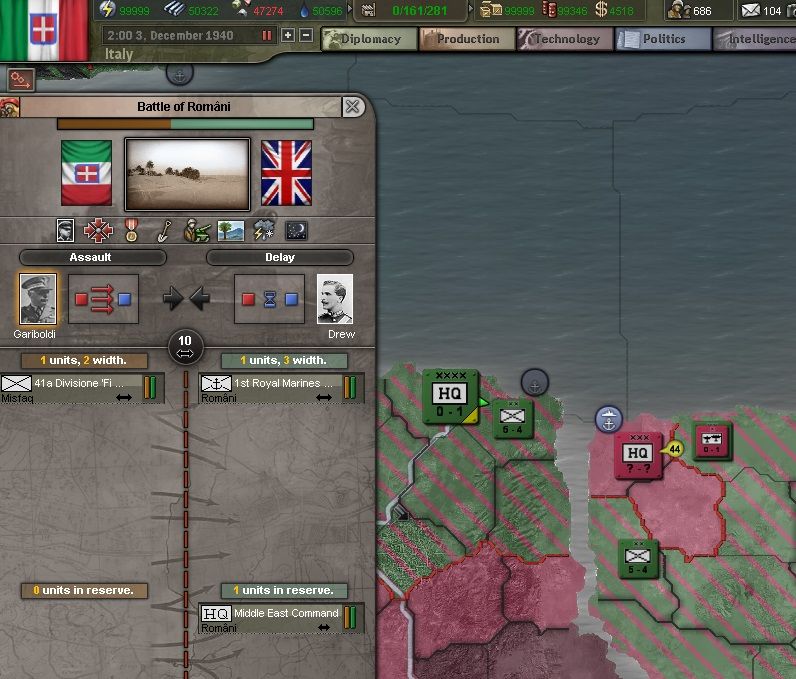
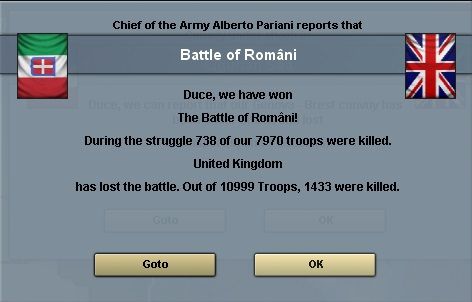
Happy New Year, 1941. We now have the Suez and will be able to rob the French and British of their supply in the Mediterranean. The only British stronghold left is Cyprus and we will turn our attention back there after our action in England.
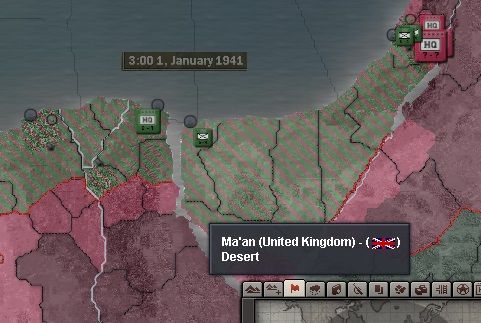
I informed Il Duce that our day of reckoning in England will be February 1. On January 7, our first three Marine divisions were commissioned, entitled “San Marco” (led by General Pintor), “Caterinetta” (led by General Gandini) and “Catald” (led by General Basso). Along with our two paratroop divisions, they make up I. Speziale Corps.
From the personal journal of Giovanni Messe:
Shortly after the surrounded French army had surrendered, we had taken half of the Suez Canal but, unfortunately, we wouldn't be able to make a direct assault on the east bank. We sent our troops on a long route, all the way around the Sinai Peninsula in order to attack the British from the east. We would give the British nowhere to retreat and capture even more troops - troops that would be unavailable to the British when it came time to attack England herself.

Throughout November and December our CAGs and naval bombers relentlessly bombed the naval base in Ajaccio where three battleships (the Lorraine, the Paris and the Courbet), a heavy cruiser (The Algerie), the light cruiser Jean d’Arc, the 3rd flottila of destroyers and the 3rd and 5th flotillas of submarines were moored. The 4th flotilla of submarines also moored after the 3rd flotilla was sunk.



On November 20, we ceased operations off the coast of Corsica in order to rest our fleets. They would be cruicial in the invasion of England in a little over 2 months time. Our radar installation in Cherbourg was up and running and we could see the coast of England on our little screens. Hopefully this would even the field of play for our ships and fighters engaging in operations in England.

We will keep some troops on French soil to keep the Frogs in line but otherwise, they are left so weak that they will not be able to interfere (at least on land) with our invasion of England.
With about two months until we launch Operazione Otaria, our arrangements are on track. With as many as 35 infantry divisions available for the invasion, the three Marine divisions (who are still training) and two paratroop divisions, we should be able to make a go of it. The only worry will be landing the initial wave of Marines and clearing the skies enough to get all of our paratroops on the ground. If we can capture a port quickly with those five divisions, we should be able ferry troops back and forth across the channel. We will also need to be able to get supplies over to England so we’ll need to be able to clear the channel of hostile ships.
The Germans have been busy, conquering Belgium and Norway and the nature of our current border will make it very difficult to field enough divisions to go head to head. We’ll need to train many more divisions and will likely need to mechanize our infantry once we know that most of our operations will remain in continental Europe.
In these last months of preparation, our researchers made several breakthroughs including for doctrines to help our special forces units perform better, a way to process rare materials more efficiently, a way to improve our invasion tactics (primarily the speed with which we could offload from landing craft) and a better torpedo that would launch from our CAGs and naval bombers.
In addition to the research that is geared specifically for our invasion, we’re also working on a more powerful tank engine for medium tanks (the Fiat SPA 8T is what they’re calling it) as well as a new engine for light tanks. We’re working on mechanizing our infantry and we’re also researching new rifles for our infantry. We have Anti-Aircraft weapons for our light cruisers being researched as well as engines and main armaments for new destroyers. Shortly after some of the current techs are being built, we’ll throw our energies into better technologies for refining steel and processing coal. We also have some aircraft carrier technologies on the back burner.
As December dawned, I briefed Mussolini on what to expect this month. We were likely to gain control of the Suez Canal, with Gioda’s 20th “Friuli” Division in Bur Said on the west side of the canal, Frusci’s 47th “Bari” Division in Bir Gifgafa, just to the south of Romani and General Gariboldi’s 41st “Firenze” Division heading to Misfaq in order to trap the 1st Royal Marines Division.



Happy New Year, 1941. We now have the Suez and will be able to rob the French and British of their supply in the Mediterranean. The only British stronghold left is Cyprus and we will turn our attention back there after our action in England.

I informed Il Duce that our day of reckoning in England will be February 1. On January 7, our first three Marine divisions were commissioned, entitled “San Marco” (led by General Pintor), “Caterinetta” (led by General Gandini) and “Catald” (led by General Basso). Along with our two paratroop divisions, they make up I. Speziale Corps.
Excellent job closing the Suez canal, that's one flank covered.
Good luck invading the British Isles, I hope they have left a defensive force behind
Good luck invading the British Isles, I hope they have left a defensive force behind
Excellent job closing the Suez canal, that's one flank covered.
Good luck invading the British Isles, I hope they have left a defensive force behind
Your comment reminded me of The Princess Bride:
"Have fun storming the castle!"
That German-Italian border....
Uh, yeah. It's pretty long. I'll try to post a screenshot in my next update.
The long border with Germany will make things interesting later on. Are they still friendly with you? From the AARs I read so far, I'm suspecting only a small welcoming party on the Isles. Let's hope I'm wrong.
Will you backstab Germany when they're busy with Russia? That'd make things quite... predictable.
The long border with Germany will make things interesting later on. Are they still friendly with you? From the AARs I read so far, I'm suspecting only a small welcoming party on the Isles. Let's hope I'm wrong.
They are still friendly. We'll see what awaits us in England!
Impressive!
THanks!
Will you backstab Germany when they're busy with Russia? That'd make things quite... predictable.
Backstab is such a harsh word. I prefer taking advantage of opportunity.
Part 31: Operazione Otaria 1 (February 1 - 15, 1940)
From the personal journal of Giovanni Messe:
The time had come. I was confident in our troops but worried about the potential beating that the Royal Navy might be able to inflict on the Regia Marina.
On February 1, we sent our fighters to patrol over Plymouth while Carrier Task Forces Aquila and Europa steamed for the Channel Approach. As they clear the way, five divisions of the XXXIII Corps and our three Marine Divisions sailed for Plymouth. With just one division defending Plymouth, it was hoped that we could gain the port quickly.
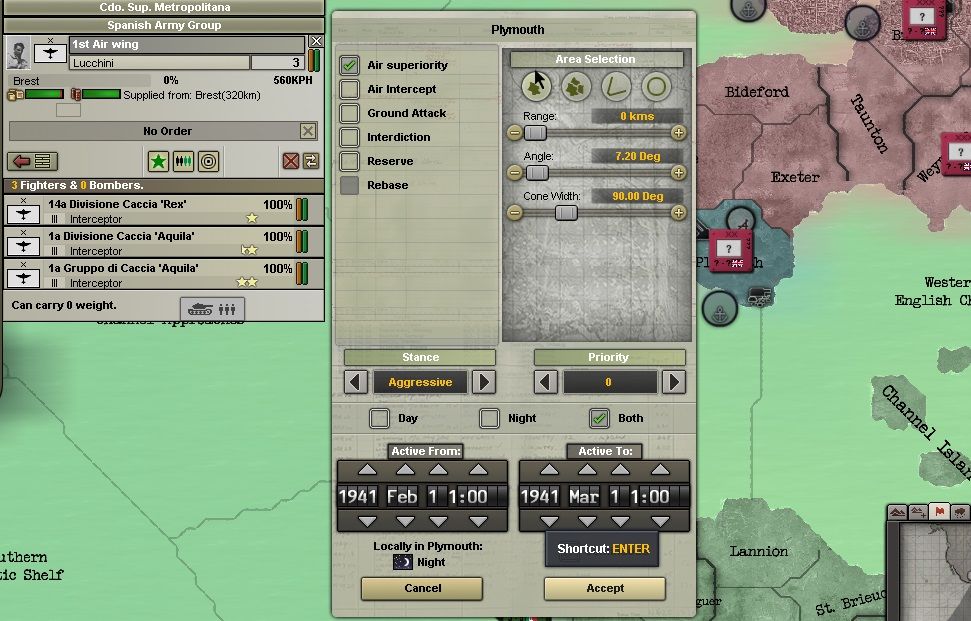
General Balbo was given orders to send his three wings of tactical bombers to soften up our target in Plymouth, three brigades of infantry.
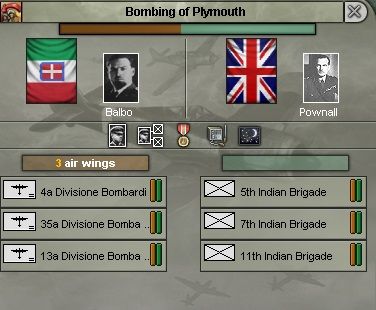
Our fleet claimed its first victim, HMS Capetown, while defending our troops who were landing in Bodmin. Upon successful landing, our troops were attacked but were able to fend it off and counterattack quickly. We did lose two ships later in the fighting: the light cruiser Bari and the a group of destroyers.
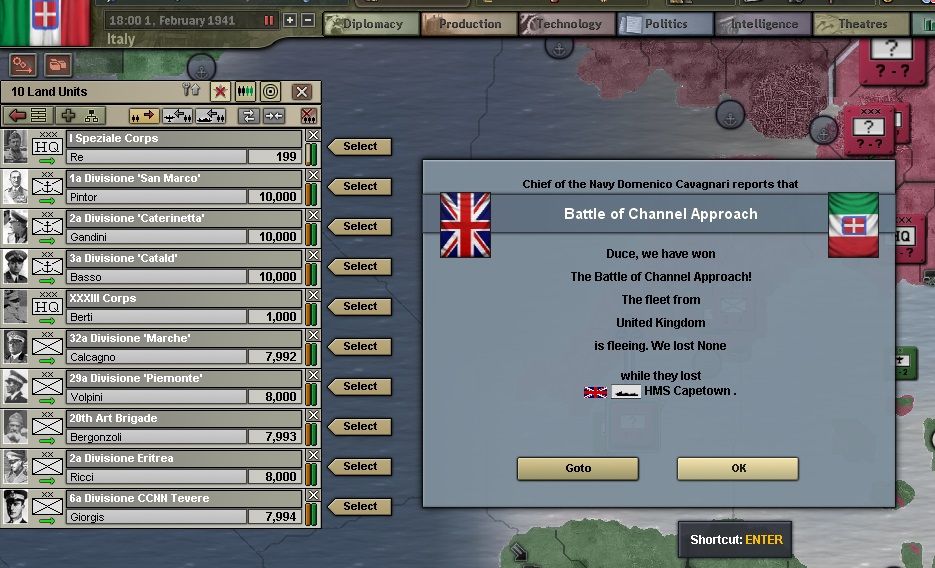
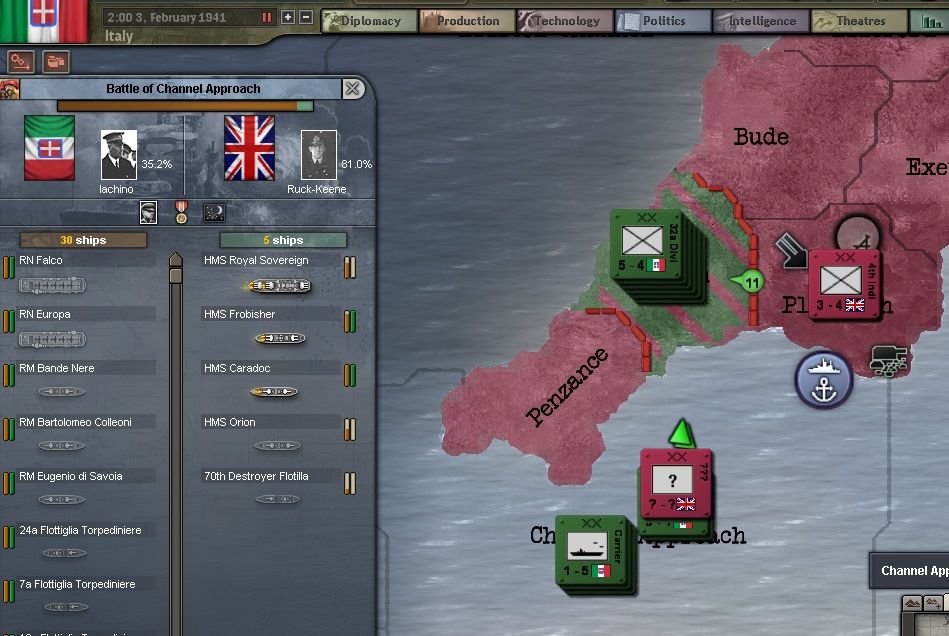
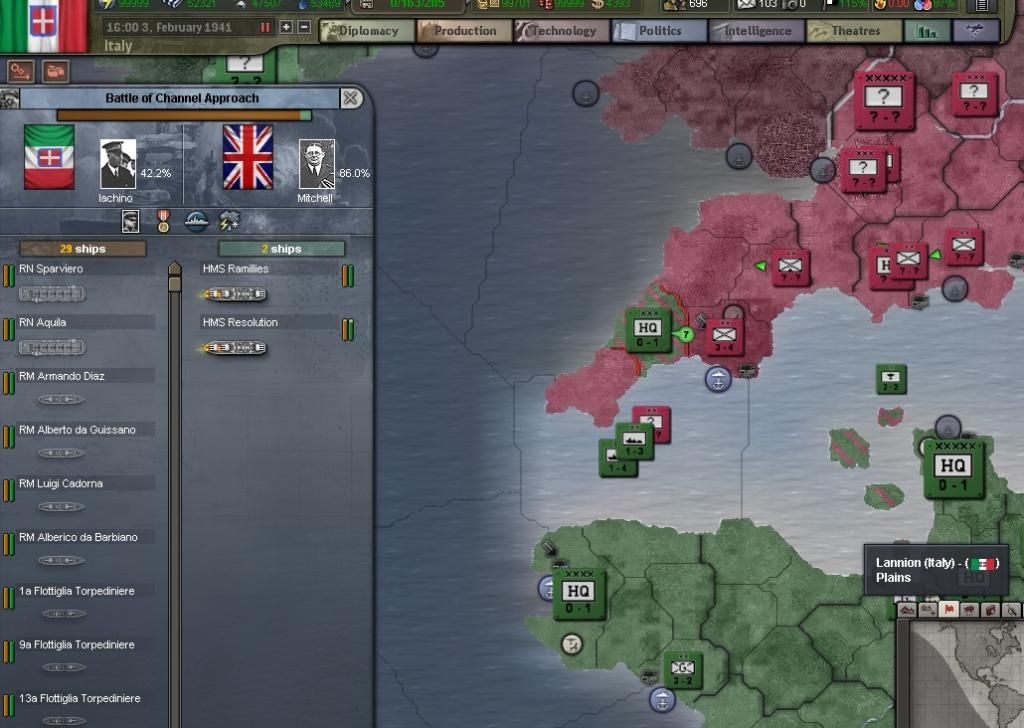
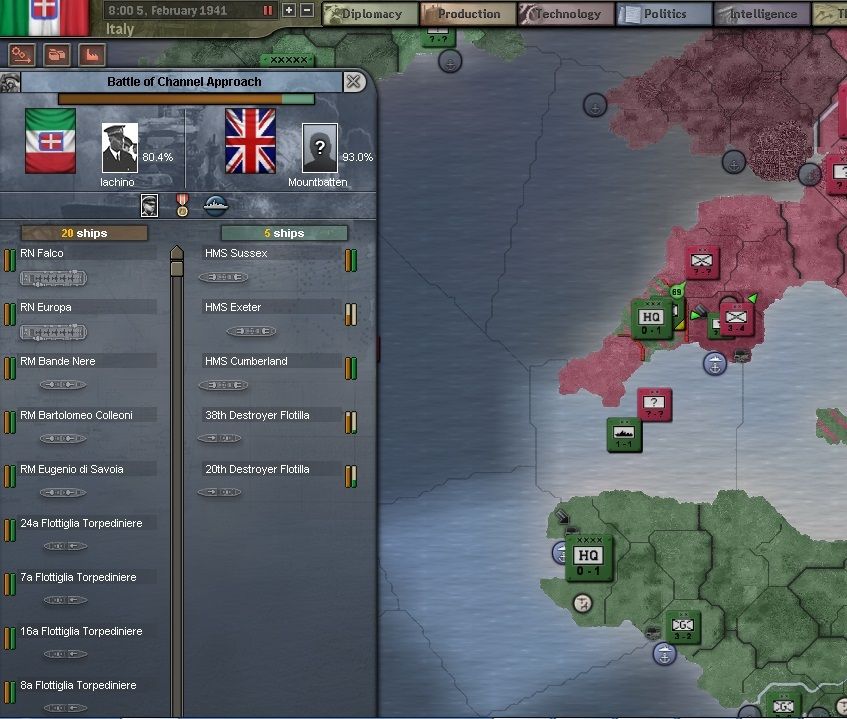
While the initial battles went very well, our troops were slowed by the poor weather and muddy roads. I made the decision to send the paratroopers in on February 9th while the British were retreating from Plymouth. The paratroops seized the port without a fight the next day and we would begin the next phase of the assault, moving up the coast to the west of England.
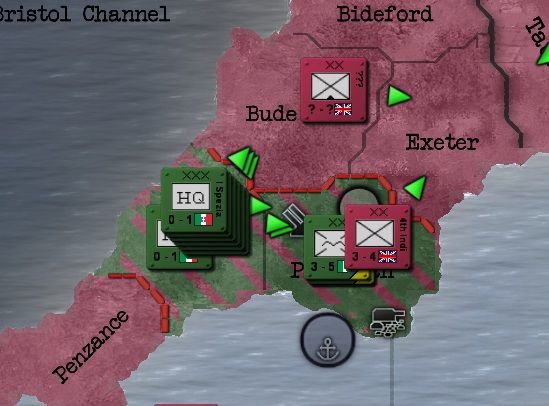
The I and XIV corps would head to Bristol Channel to try to take the ports of Cardiff, Pembroke and Bristol. While the British fleet was fleeing from Plymouth harbour, we managed to sink the heavy cruiser HMS Exeter, losing only a destroyer group. In Bristol Channel, with just our smaller carrier taks force Sagittario, we were attacked but managed to sink two British Destroyer groups.
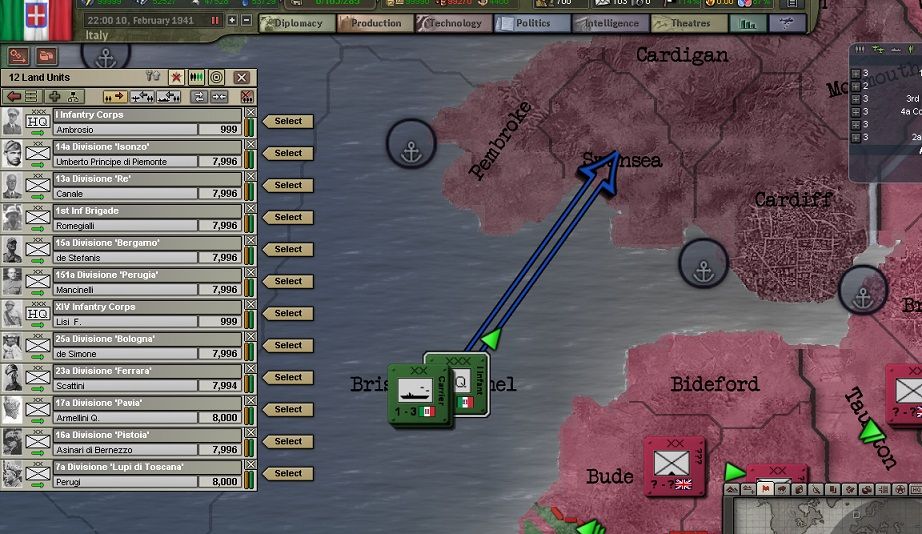
The Fleet Carrier Furious and Escort Carrier Argus were in on the fun in the second battle of Bristol Channel but despite the British fleet’s attempts, they were not able to dislodge us.
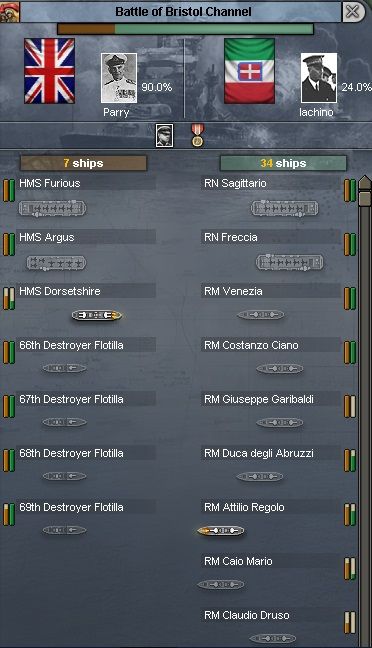
As our troops moved inland, the group from the first landing were moving in position to surround four British divisions at Exeter. If we could accomplish this encirclement, we would be able to cut down on the amount of resistance that the British would be able to mount in later attacks.
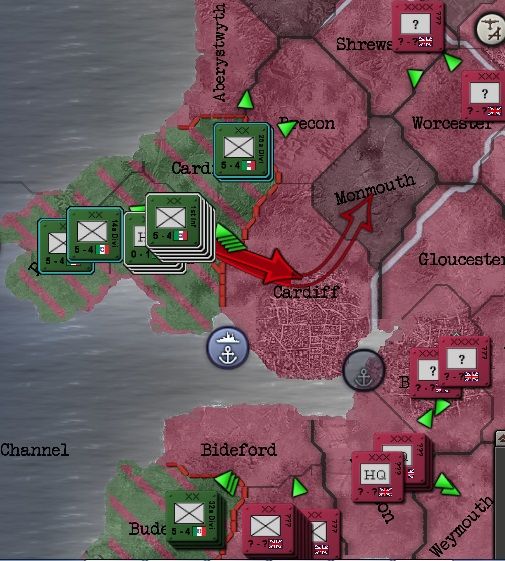
From the personal journal of Giovanni Messe:
The time had come. I was confident in our troops but worried about the potential beating that the Royal Navy might be able to inflict on the Regia Marina.
On February 1, we sent our fighters to patrol over Plymouth while Carrier Task Forces Aquila and Europa steamed for the Channel Approach. As they clear the way, five divisions of the XXXIII Corps and our three Marine Divisions sailed for Plymouth. With just one division defending Plymouth, it was hoped that we could gain the port quickly.

General Balbo was given orders to send his three wings of tactical bombers to soften up our target in Plymouth, three brigades of infantry.

Our fleet claimed its first victim, HMS Capetown, while defending our troops who were landing in Bodmin. Upon successful landing, our troops were attacked but were able to fend it off and counterattack quickly. We did lose two ships later in the fighting: the light cruiser Bari and the a group of destroyers.




While the initial battles went very well, our troops were slowed by the poor weather and muddy roads. I made the decision to send the paratroopers in on February 9th while the British were retreating from Plymouth. The paratroops seized the port without a fight the next day and we would begin the next phase of the assault, moving up the coast to the west of England.

The I and XIV corps would head to Bristol Channel to try to take the ports of Cardiff, Pembroke and Bristol. While the British fleet was fleeing from Plymouth harbour, we managed to sink the heavy cruiser HMS Exeter, losing only a destroyer group. In Bristol Channel, with just our smaller carrier taks force Sagittario, we were attacked but managed to sink two British Destroyer groups.

The Fleet Carrier Furious and Escort Carrier Argus were in on the fun in the second battle of Bristol Channel but despite the British fleet’s attempts, they were not able to dislodge us.

As our troops moved inland, the group from the first landing were moving in position to surround four British divisions at Exeter. If we could accomplish this encirclement, we would be able to cut down on the amount of resistance that the British would be able to mount in later attacks.

It would appear that the British Isles would be yours soon since securing the foothold definitely guarantee their defeat. I'm going to assume it would be smooth sailing from this point on.
A promising open to your campaign in the isles!
Woot!
It would appear that the British Isles would be yours soon since securing the foothold definitely guarantee their defeat. I'm going to assume it would be smooth sailing from this point on.
We shall see!
Part 32: Operazione Otaria 2 (February 16 - March 1, 1941)
From the personal journal of Giovanni Messe:
The battle for England saw an important development early in the fight that allowed me to report to Il Duce that we had been able encircle several British divisions.
Thanks to some quick thinking generals on the ground, immediately after we had taken Plymouth as our primary port for supplies, we engaged troops in Exeter that had come to meet our initial assault. By holding the troops there with pinning attacks, we had enough force on the ground to quickly move up, over and around the British troops, clearing out a corridor in which to surround the Brits. On February 17, we had won the battle at Taunton and by the 19th, our 32nd and 29th infantry divisions were on their way to Taunton to close the half-circle.
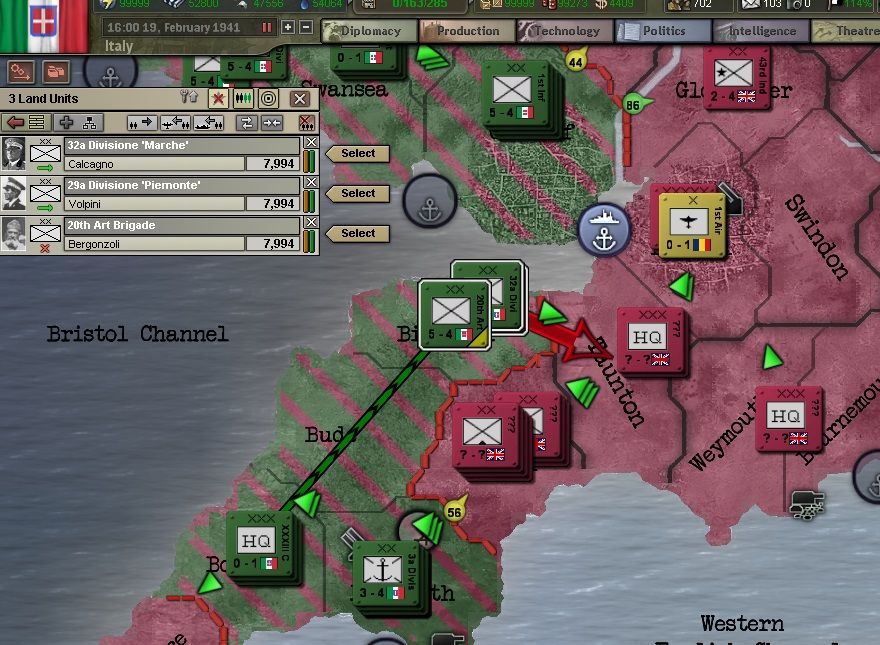
An attempted breakout was stopped by our forces in Taunton and the battle for Exeter was well under way with General Gandini and his special forces units leading a reckless assault.
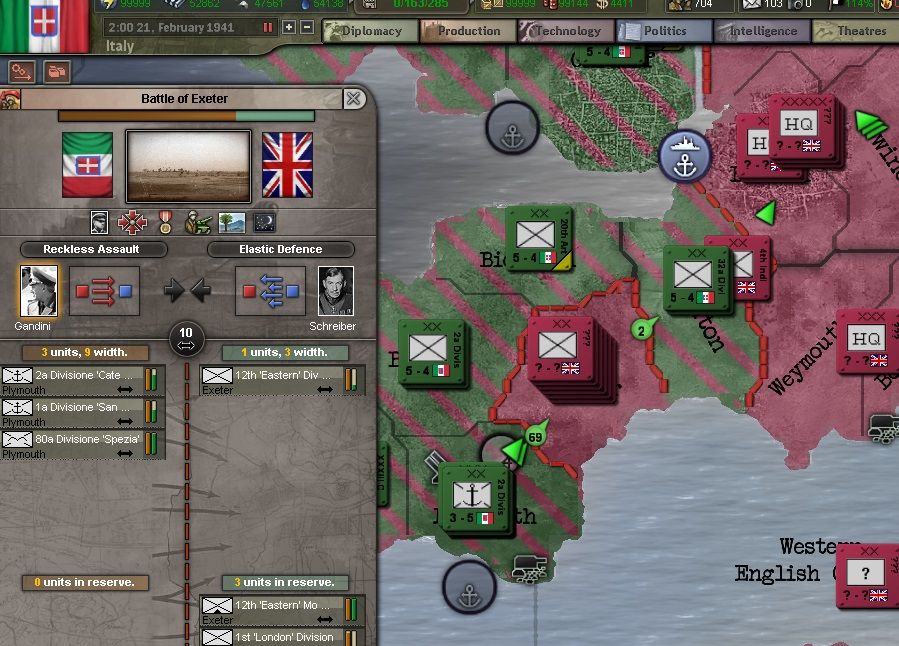
By February 23, we had encircled and captured almost 100,000 British troops in the battle of Exeter and were slowly pushing inland from Wales.
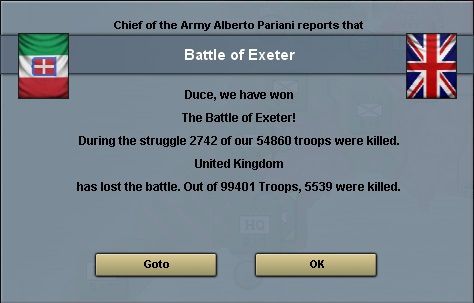
With an attack on Bristol pending, we had our three Carrier Task Forces sitting off the coast ready to engage the British Fleet sitting in Bristol Harbour.
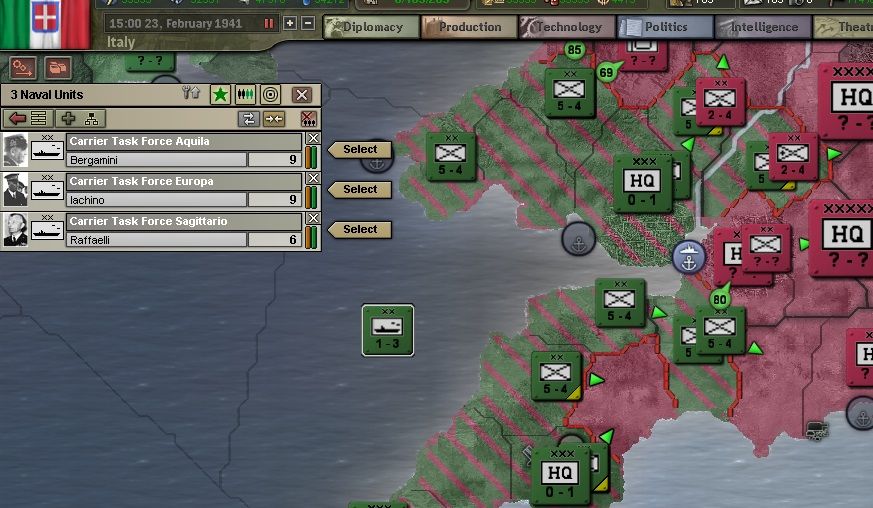
Once Bristol fell, our fleets had the best of the British in the Battle of Bristol Channel although we didn't end up sinking any ships.
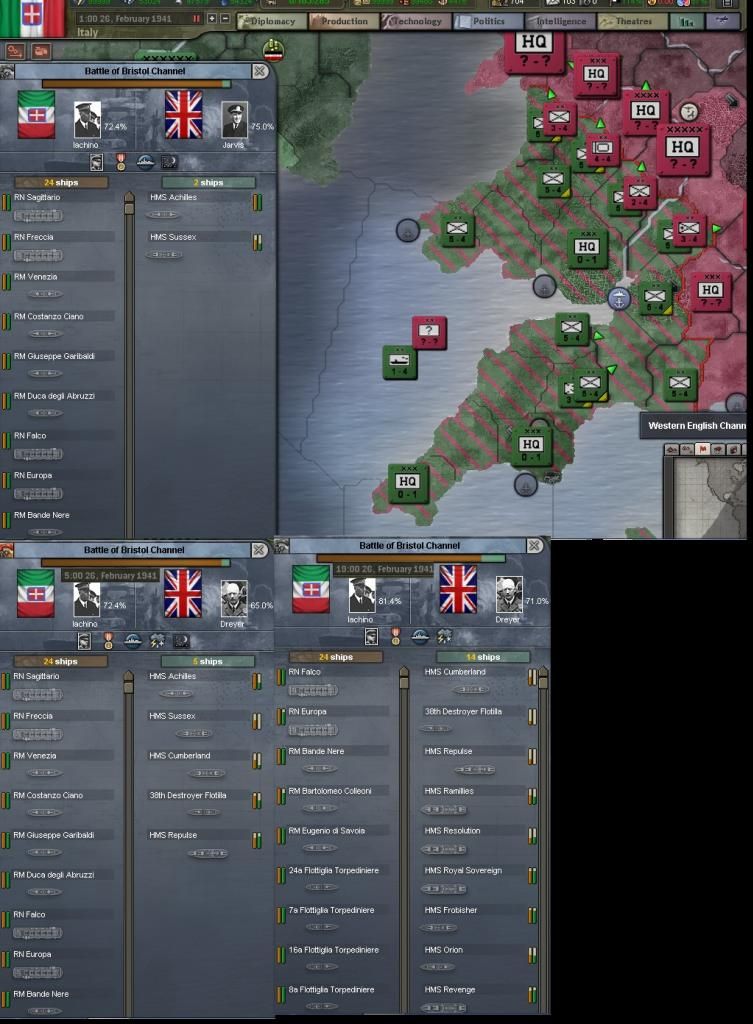
By this point, we were bombing the naval base at Bournemouth and preparing for our next group of landings on the east side of England. Once we overtook Bournemouth with our troops, HMS Sussex and Achilles were forced out to sea, encountering our fleet and getting sunk.
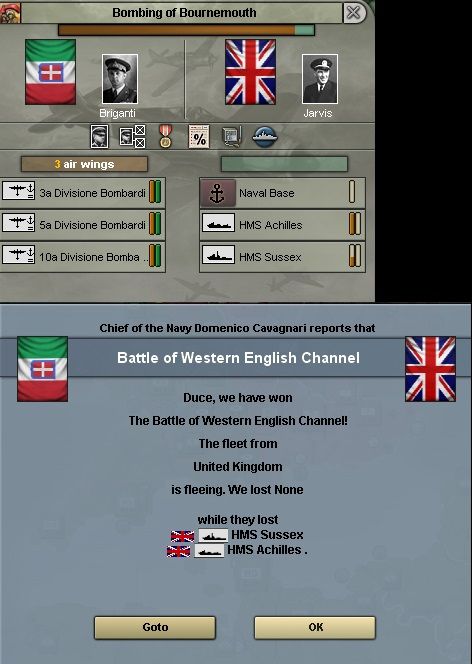
From the personal journal of Giovanni Messe:
The battle for England saw an important development early in the fight that allowed me to report to Il Duce that we had been able encircle several British divisions.
Thanks to some quick thinking generals on the ground, immediately after we had taken Plymouth as our primary port for supplies, we engaged troops in Exeter that had come to meet our initial assault. By holding the troops there with pinning attacks, we had enough force on the ground to quickly move up, over and around the British troops, clearing out a corridor in which to surround the Brits. On February 17, we had won the battle at Taunton and by the 19th, our 32nd and 29th infantry divisions were on their way to Taunton to close the half-circle.

An attempted breakout was stopped by our forces in Taunton and the battle for Exeter was well under way with General Gandini and his special forces units leading a reckless assault.

By February 23, we had encircled and captured almost 100,000 British troops in the battle of Exeter and were slowly pushing inland from Wales.

With an attack on Bristol pending, we had our three Carrier Task Forces sitting off the coast ready to engage the British Fleet sitting in Bristol Harbour.

Once Bristol fell, our fleets had the best of the British in the Battle of Bristol Channel although we didn't end up sinking any ships.

By this point, we were bombing the naval base at Bournemouth and preparing for our next group of landings on the east side of England. Once we overtook Bournemouth with our troops, HMS Sussex and Achilles were forced out to sea, encountering our fleet and getting sunk.


